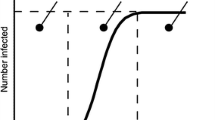Abstract
This contribution deals with policy ‘borrowing’ as a phenomenon in comparative inquiry in education, covering how it has developed conceptually and attempting some definitions of what it entails. It describes policy borrowing processes and presents in detail the models developed by Phillips and Ochs as a heuristic device to help with their analysis and interpretation.
Access this chapter
Tax calculation will be finalised at checkout
Purchases are for personal use only
Similar content being viewed by others
References
Carnoy, M., & Rhoten, D. (2002). What does globalization mean for educational change? A comparative approach. Comparative Education Review, 46(1), 1–9.
Fraser, S. (1964). Jullien’s plan for comparative education, 1816–17. New York: Teachers College Press.
Goodman, R. (1991). Japan – Pupil turned teacher? In D. Phillips (Ed.), Lessons of cross-national attraction in education (pp. 155–173). Wallingford: Triangle Books.
Higginson, J. H. (Ed.). (1979). Selections from Michael Sadler. Liverpool: Dejall & Meyorre.
Noah, H. J., & Eckstein, M. A. (1969). Toward a science of comparative education. London: Macmillan.
Ochs, K., & Phillips, D. (2002a). Towards a structural typology of cross-national attraction in education. Lisbon: Educa.
Ochs, K., & Phillips, D. (2002b). Comparative studies and cross-national attraction in education: A typology for the analysis of English interest in educational policy and provision in Germany. Educational Studies, 28(4), 325–339.
Phillips, D. (1989). Neither a borrower nor a lender be? The problems of cross-national attraction in education. In D. Phillips (Ed.), Cross-national attraction in education, special issue of Comparative Education, 25(3), 267–274.
Phillips, D. (1993). Borrowing educational policy. In D. Finegold, L. McFarland, & W. Richardson (Eds.), Something borrowed? Something learned? The transatlantic market in education and training reform (pp. 13–19). Washington, DC: Brookings Institution Press.
Phillips, D. (1997). Prolegomena to a history of British interest in education in Germany. In C. Kodron et al. (Eds.), Vergleichende Erziehungswissenschaft, Herausforderung – Vermittlung – Praxis. Festschrift für Wolfgang Mitter zum 70. Geburtstag (Comparative education: Challenges, transmission, practice. Festschrift for Wolfgang Mitter’s 70th birthday) (Vol. 2, pp. 673–687). Cologne: Böhlau.
Phillips, D. (2000). Learning from elsewhere in education: Some perennial problems revisited with reference to British interest in Germany. Comparative Education, 36(3), 297–307.
Phillips, D. (2002). Reflections on British interest in education in Germany in the nineteenth century: A progress report. Lisbon: Educa.
Phillips, D. (2003). A typology of cross-national attraction in education. In G. Steiner-Khamsi (Ed.), Lessons from elsewhere: The politics of educational borrowing and lending. New York: Teachers College Press.
Phillips, D., & Ochs, K. (2003). Processes of policy borrowing in education: Some explanatory and analytical devices. Comparative Education, 39(4), 451–461.
Sadler, M. (1900). How far can we learn anything of practical value from the study of foreign systems of education? Address of 20 October. In J. H. Higginson (Ed.), Selections from Michael Sadler. Liverpool: Dejall & Meyorre.
Samoff, J. (1999). Institutionalizing international influence. In R. F. Arnove & C. A. Torres (Eds.), Comparative education. The dialectic of the global and the local (pp. 51–89). Lanham: Rowman & Littlefield.
Shibata, M. (2001). The education reform in Japan and Germany under the American Military occupation after World War Two: A comparative study. Unpublished doctoral dissertation, University of London, London.
Zymek, B. (1975). Das Ausland als Argument in der Pädagogischen Reformdiskussion (The foreign country as an argument in discussion on educational reform). Ratingen: Aloys Henn Verlag.
Author information
Authors and Affiliations
Corresponding author
Editor information
Editors and Affiliations
Rights and permissions
Copyright information
© 2015 Springer Science+Business Media B.V.
About this chapter
Cite this chapter
Phillips, D. (2015). Policy Borrowing in Education: Frameworks for Analysis. In: Zajda, J. (eds) Second International Handbook on Globalisation, Education and Policy Research. Springer, Dordrecht. https://doi.org/10.1007/978-94-017-9493-0_9
Download citation
DOI: https://doi.org/10.1007/978-94-017-9493-0_9
Published:
Publisher Name: Springer, Dordrecht
Print ISBN: 978-94-017-9492-3
Online ISBN: 978-94-017-9493-0
eBook Packages: Humanities, Social Sciences and LawEducation (R0)




